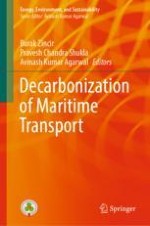2023 | OriginalPaper | Chapter
3. Lifecycle Emissions of Fossil Fuels and Biofuels for Maritime Transportation: A Requirement Analysis
Authors : Cagatayhan Sevim, Burak Zincir
Published in: Decarbonization of Maritime Transport
Publisher: Springer Nature Singapore
Activate our intelligent search to find suitable subject content or patents.
Select sections of text to find matching patents with Artificial Intelligence. powered by
Select sections of text to find additional relevant content using AI-assisted search. powered by
